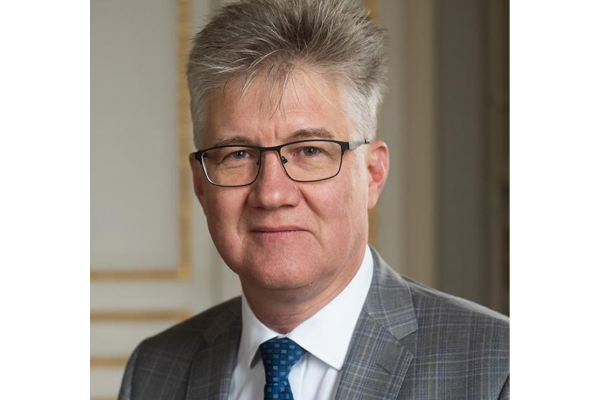Between History and Politics: Dr. Ivan Kurilla’s Journey from Russia to Ohio State (Part 1)

The Center for Slavic, East European and Eurasian Studies (CSEEES) recently welcomed Dr. Ivan Kurilla, a historian of Russian-American relations and visiting scholar in Ohio State’s Department of History, for a conversation about his academic journey, his forced departure from Russia, and the evolving role of history in politics. Kurilla, whose career spans institutions in both Russia and the United States, shared insights with CSEEES autumn 2025 intern Cody Allen on exile, scholarship, and the ways history serves as a dialogue between past and present.
Background
When looking through the courses offered in The Ohio State University’s history department, students and faculty may notice one new name: Dr. Ivan Kurilla. Kurilla is a visiting scholar at Ohio State, one of many American universities he’s taught at since 2024, after previously teaching at European University at St. Petersburg. Yet, he never anticipated to stop teaching in Russia: “When I came [to the United States in 2024], I did not plan to emigrate. I’ve studied in the United States; I've been here dozens of times for relatively short or relatively long periods, but usually less than a year,” he said.
This stark change was set into motion in February 2022. Kurilla noted that while Russian politics were increasingly authoritarian before the Russian invasion of Ukraine, “when Mr. Putin attacked Ukraine and started the war, it was like an overnight change in domestic politics”. It became a dangerous environment to criticize the war and Putin demonstrated this by using “random repressions”. According to Kurilla, the Putin regime couldn’t arrest everyone in the opposition as simply too many people opposed the war. Instead, he resorted to random arrests to create an atmosphere of fear to prevent opposition. Amid the risks, Kurilla remained in Russia and became a vocal opponent of the war. He took to social media and speaking to different journalists to express his opposition.
This opposition led to several anonymous denunciations addressed to the university rector and the Ministry of Higher Education, to which the university reacted nervously. To cool things down, he applied for a short, semester-long sabbatical to the United States. He planned to spend a semester at Wellesley College as a visiting professor before returning in the fall. However, just as he was leaving Russia for the United States, “My rector decided that it would be easier to just fire me… And so, I found myself without a place to return; There was no job for me in Russia,” he said. Kurilla found himself stuck in the United States, with a position that would last a semester.
After arriving in America, he first went to Wellesley College in Massachusetts, as planned (spring 2024). He originally didn’t know where he would end up, as he couldn’t return to Russia. But soon after, he was offered a position at Bowdoin in Maine (fall 2024). He then was invited back to Wellesley during the spring of 2025 and then spent the summer teaching at the Middlebury Language School at Middlebury College in Vermont. Now, he is teaching in the Department of History at Ohio State as a visiting scholar until spring 2026. When talking about his experiences, he mentioned how grateful he felt: “I’m very thankful to each of the professors and administrators who invited me. It helped me a lot, because I lost my job and my country.”
Research and Interests
Kurilla originally studied at Volgograd State University (VolSU) in 1986, undertaking a 5-year specialist program studying the history of the United States with a focus on foreign policy. During his fifth year in 1990, he studied at Kent State University as part of an exchange program. After graduating in 1991, he went on to defend his candidacy dissertation (equivalent to a PhD) in 1996. He then defended his doctoral dissertation (equivalent to European habilitation) in 2005, which focused on Russian American relations in the antebellum period. Both dissertations were defended in Moscow at the Institute for Universal History within the Russian Academy of Sciences.
These experiences gave him a strong background in Russian American foreign relations, especially in the antebellum period. He considered this his primary field of study. But after defending his candidacy dissertation, his research broadened to a second field: the political use and misuse of history.
“Somehow, I found myself in several situations where I was in the company of political scientists. I'm a historian; my background and my professional identity reflect that, but I was invited in 1999 or 2000 to become a member of an international network, called the Program on New Approaches to Research and Security in Eurasia (PONARS),” he said. Within an environment of political and social sciences, he started to think through their eyes when considering his field of history. This impetus is what pushed him to think about history as a tool of political action.
For Kurilla, one metaphor in particulate encapsulates this idea of history being used as a tool at times: “History is a dialogue between contemporary societies and the past”. When he was a student, he noted many professors saw history as something atop the ‘ivory tower’, unconnected to other realms like politics. But through formative experiences including joining PONARS, it became clear history wasn’t isolated or insulated from other parts of society: it was the site of an active dialogue. Thus, it’s important to not only understand history from the perspective of knowing primary sources but also knowing how contemporary society views or reconstitutes it.
But how does AI impact dialogue between the past and present? How is Putin using history as a tool of political action? These questions, alongside discussions about the current context of U.S. Russian relations can be found in part 2 of the interview.
